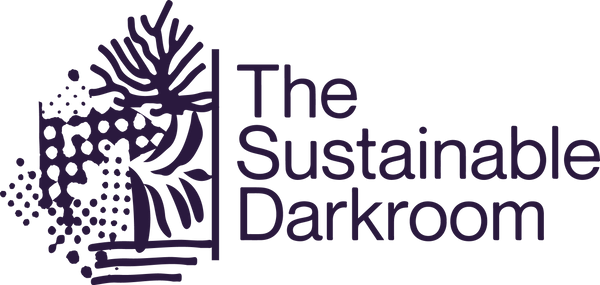The Sustainable Darkroom
Reversal film: low toxicity B&W diapositives
Reversal film: low toxicity B&W diapositives
Couldn't load pickup availability
The Sustainable Darkroom invites you to participate in our Slow Photography series, fusing theory and practice, to provide you with a deeper and more critical view of sustainability in photographic and filmmaking practice.
This is a four-part, online workshop taking place over the following Mondays in July: 1st, 8th, 15th and 22nd from 4.30pm - 6pm (BST).
With an emphasis on DIY methods, participants will be guided through a series of short talks, creative tasks, discussions and experimentation. Over the weeks, they will learn the process and generate their own unique visualisations on diapositive film.
Experience Level: Participants should have knowledge and experience of shooting and developing film independently in homemade, plant based developers. This workshop will not cover how to expose or develop your black and white negatives.
Tools:
- A changing bag or darkroom / a room (eg bathroom) that can be light - tight (for loading the film)
-
Developing tank, spools, bottles etc… The same setup as black and white negative development. (You can use old plastic water and drinks bottles)
- A thermometer
- Light Source: 150-watt bulb
- A good respirator or well ventilated room (could be outside), if working with ammonia, the smell is very strong.
- Ph paper or meter
- Precision weighing scales up to 0.01 grams
- Gloves (we recommend reusable kitchen sink gloves such as marigolds)
- An apron / lab coat or old clothes
Materials:
-
Film: Diapositive black and white (slide) film (preferably fomapan 100r, price/quality ratio it’s the best. You could use other black and white slide film, Preferably iso 100)
-
Materials to make a plant-based developer (e.g. nettle, caffenol, rosemary, seaweed etc)
-
Copper sulphate
-
Salt
-
Hydrogen peroxide ( 12%)
-
Vinegar (7%acetic acid ) or lemon juice
-
Ammonia
-
Fixer: Rapid fixer (do not use hardening fixer) or sodium thiosulphate fixer.
-
Water: tap water or rain water
-
A DIY Bain Marie system / Jobo developing machine or similar water heater
*All materials will be discussed in further depth in session 1*
Session 1: Set Up and Introduction (1st July)
In this session we will cover:
- An overview of sustainable photographic practices and why Nick works with them.
- A discussion on plant-based developers and eco-friendly bleaching techniques.
- A practical demonstration of the Diareversal process using home made developers.
- Self-directed work will include practising the initial development steps in your own time.
Session 2: The Bleaching Process (8th July)
In this session we will cover:
- Advanced techniques in Dia Reversal image development- Troubleshooting common issues during development.
- A practical demonstration of bleaching and re-exposure steps.
- Self-directed work will include practising the bleaching and re-exposure steps in your own time.
Session 3: Redevelopment and Fixing (15th)
In this session we will cover:
- A review of the initial work done over the week.
- The safe handling and longevity of chemicals and plant-based developers.
- A demonstration of the redevelopment and fixing steps.
- Self-directed work will include practising the redevelopment and fixing steps in your own time.
Session 4: How did it all go: Final review & Troubleshoot (22nd July)
In this session we will cover:
- Final day of the Dia reversal process.
- Archiving, exhibiting and storage.
- Time to share the final results of the process, troubleshoot and ask questions.
------
Nick Verhaeghe lives and works in Knokke-Heist, Belgium, where he has his own atelier. In his work he reflects on the photographic medium and all of its alternative facets. He investigates the connections between the medium's technical boundaries and how photography shapes memory. He is interested in alternative photographic techniques to capture and catalogue light. He researches, like an alchemist, how actual light is transformed into an image by utilising nature and unconventional products in his visual language.
nickverhaeghe.be
@nick.verhaeghe
For reduced price tickets, please email us detailing your situation before booking.
Share


